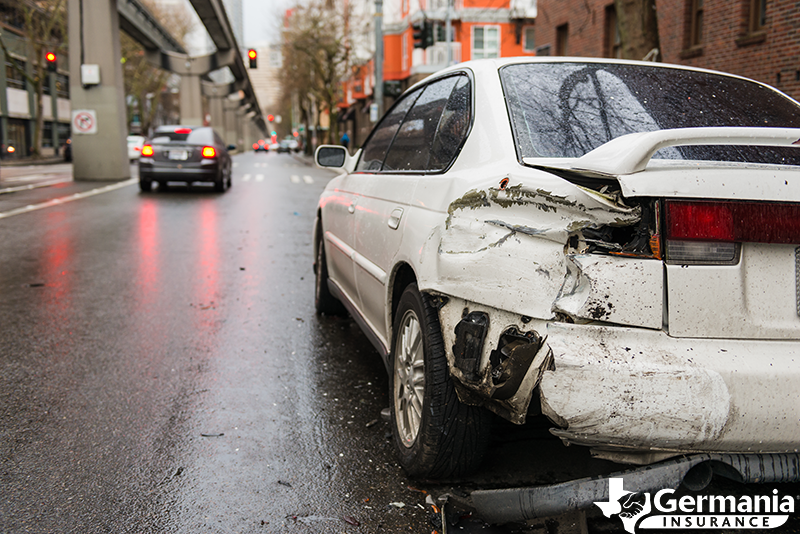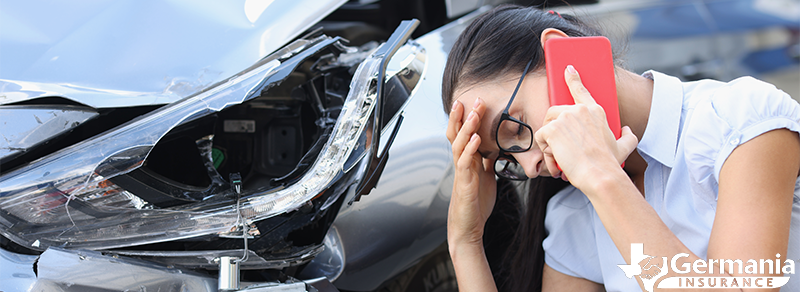Learn what to do if you are involved in a hit and run car accident in Texas.

As drivers, we have certain responsibilities to adhere to when driving on Texas roads: Be safe, be courteous, carry auto insurance, and make sure to identify yourself to others if you're involved in an accident. While that last one may sound obvious, it is unfortunately not always the case.
If a driver leaves the scene of an accident before doing this or fails to stop entirely, this is considered a hit and run. Hit and runs are a serious offense in the state of Texas. In fact, it’s a felony offense in Texas if a driver flees an accident where anyone is injured or killed.
So if you're involved in a hit and run, what should you do? Hopefully you never are, but if happens to you, there are some things you'll want to be aware of. Read on as we tell you what you need to know when it comes to Texas hit and run laws as well as how and when to report the accident.
What is a hit and run in Texas?
A hit and run occurs when a driver leaves the scene of an accident without notifying the police, identifying themselves to the other driver(s), or providing aid to anyone who is injured. This accident could involve a driver striking another vehicle, bicyclist, pedestrian, or property. The accident can even involve a driver hitting an unattended vehicle in a parking lot.
According to Texas law, the driver who causes the accident has a responsibility to stop and share their contact information and car insurance details with the other party. If necessary, they should also give aid and contact the police and paramedics. Drivers who hit unattended vehicles are responsible for leaving their contact and car insurance company information in a visible place.
Even if you are not at fault for the accident, you still need to remain on the scene until they exchange necessary information between parties. Texas state law requires you to exchange the following information between drivers involved in an auto accident:
- Driver’s name
- Driver’s address
- Vehicle registration number
- Insurance information
- Driver’s license
Leaving before you exchange this information constitutes a hit and run and is punishable by law, even if no personal injury is involved.
Texas hit and run laws
According to
Texas law, leaving the scene of an accident that involves serious bodily injury is a second-degree felony, and death is a third-degree felony. This is punishable by 2 to 10 years in state prison. Less serious injuries might result in a felony punishable by up to one year in county jail or up to 5 years in state prison along with a fine of up to $5,000.
If you’re involved in a hit and run that causes damage to an occupied or unattended vehicle, this is considered a Class C misdemeanor. This misdemeanor may result in a fine of up to $500 if the damage to all vehicles is less than $200. For damage over $200, the offense is considered a Class B misdemeanor and can result in up to 6 months in a county jail.
Penalties for the hit and run driver will depend on the circumstances of the accident. For example, if there is minimal damage and no serious injuries, a person without any previous felonies may receive probation or community supervision.
Others involved in hit and run accidents with different circumstances may be sentenced to jail or prison time. A conviction can also result in the suspension of the hit and run driver’s license.
What to do after a hit and run in Texas
If you are the victim of a hit and run, there are a few things you should do after the incident:
Make sure everyone is safe.
Your first priority is to make sure that everyone is safe. Move your vehicle out of the way of traffic. Check on passengers in your vehicle to see if anyone has suffered bodily injury and needs medical care.
You’ll also want to check yourself for any injuries. When an accident first happens, you may be in shock and not realize you are injured. Do a body scan to make sure you are alright.
Call law enforcement.
Next, you’ll want to call law enforcement.
Calling the police and reporting the incident will significantly increase your chances of finding the hit and run driver. If you call the police within 24 hours of the accident, they will be able to collect evidence, interview witnesses, and search for clues—all of which may be important to their investigation.
The police report will document the time and location of the accident, which may be important to the hit and run driver investigation. Not to mention, you will most likely need the police report later.
Your insurance company will likely require a copy of the police report if you file an uninsured motorist insurance claim. If you decide to file a civil suit against the driver later, you will also need the police report.
Write down any details about the driver or vehicle.
After you call the police, try to write down any details about the driver or vehicle that you can remember. Write down any notes you can about the make, model, and color of the vehicle. If you have a license plate number or other details like the state it was issued in, write this down as well.
If there is any physical evidence or property damage, make sure you point this out to the police officers when they arrive. This could be a piece of the hit and run driver’s vehicle or even a paint scratch on your car. All of these details can be important in finding the driver.
Call your insurance company.
Call your insurance company to let them know you have been involved in a hit and run accident. They will let you know what information you need to file an insurance claim.
Your insurance company will also help you better understand what coverage you have for this type of accident. If you have
uninsured motorist coverage, this may cover damage caused by a hit and run driver.
How long do you have to report a hit and run?
If you are the victim of a hit and run accident, you will want to report it to the police as soon as possible. Ideally, you will call law enforcement from the scene of the accident so they can collect any information or physical evidence that may help catch the hit and run driver.
According to the statute of limitations in Texas, you have two years to report a hit and run accident as a crime to law enforcement. However, it’s important to note that if you do not report the accident within 24 hours, you may not be able to file an insurance claim. Also, the evidence and witnesses may disappear, making it harder to find the driver at fault.
Will my insurance cover a hit and run accident?
You might be wondering, will my insurance cover a hit and run accident? And the answer will depend on your specific insurance coverage. However, it’s important to know
how insurance coverage generally works under the circumstances of a hit and run.
Personal injury protection coverage will typically cover any medical care you or your passengers may need after the accident. If there is damage to your car and the other driver is found, you can make a claim through their liability coverage. However, if they are not found, there is another option to pursue to help cover the cost of repairs.
Uninsured/underinsured motorist coverage is an optional type of coverage that you can add to your insurance policy. This type of coverage is meant to pay for damages to your vehicle if you are in an accident with someone who doesn’t have insurance or doesn’t have enough insurance. Uninsured/underinsured motorist coverage may protect you if the hit and run driver is never identified.
Ultimately, insurance can help cover the costs of injuries and property damage in the event of a hit and run in Texas. However, you will need to opt into the right types of coverage to ensure you’re protected.
To see if you are covered in the event of a hit and run, be sure to reach out to your insurance agent. They will be able to make sure you have the coverage you need if you ever find yourself in this situation.
 Make sure you have adequate protection in the event of a car accident. For more information about Germania and our insurance products, request a free quote online, or reach out to your local Germania Authorized Agent today!
Make sure you have adequate protection in the event of a car accident. For more information about Germania and our insurance products, request a free quote online, or reach out to your local Germania Authorized Agent today!